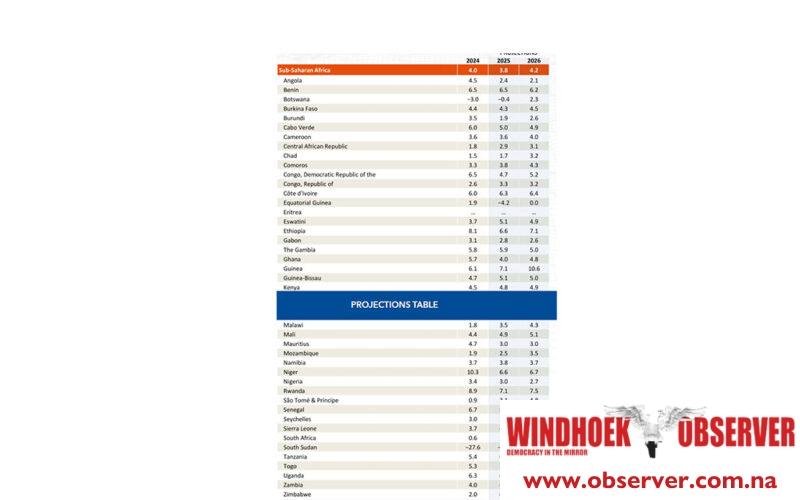CHAMWE KAIRA
Namibia’s economy is projected to grow by 3.8% in 2025, according to the International Monetary Fund (IMF)’s latest forecast.
This represents a slight increase from 3.7% recorded in 2024 and matches the IMF’s projection for 2026.
Among neighbouring countries, Zambia and Zimbabwe are expected to post the highest growth rates. Zambia’s economy is projected to grow by 6.2% in 2025, up from 4.0% in 2024, and to reach 6.8% in 2026.
Zimbabwe is expected to grow by 6.0% in 2025, up from 2.0% in 2024, with a slight drop to 4.6% in 2026.
In contrast, Botswana’s economy is expected to shrink by 0.4% in 2025, after growing by 3.0% in 2024. A rebound to 2.3% is projected for 2026.
Angola’s growth is expected to slow to 2.4% in 2025, from 4.5% in 2024, and further decline to 2.1% in 2026.
South Africa, Namibia’s largest trading partner, is forecast to grow by 1.1% in 2025, up from 0.6% in 2024, with a modest increase to 1.3% in 2026.
The IMF warned that many economies in sub-Saharan Africa continue to face challenges following four years of economic crisis.
The region is now facing additional pressure from global policy shifts, including new tariff measures introduced by the United States and the responses from its trade partners.
Overall, growth in sub-Saharan Africa is expected to slow to 3.8% in 2025 and 4.2% in 2026. These are downward revisions of 0.4 and 0.2 percentage points, respectively, from previous estimates.
“The slowdown has been driven in large part by turbulent global conditions, as reflected in lower external demand, subdued commodity prices, and tighter financial conditions, with more significant downgrades for commodity exporters and countries with larger trade exposures to the United States,” the IMF said.
The IMF also warned that global uncertainty remains high.
It said further trade tensions or tighter financial conditions in advanced economies could impact investor confidence, slow economic activity, and increase borrowing costs across the region.
“These uncertain times call for continuous fine-tuning of policies to strike a balance between advancing growth and social development with macroeconomic stability,” the IMF said.
It added that governments need to build fiscal and foreign reserves, and ensure consistent and credible economic policies.
The IMF also highlighted that about one-third of sub-Saharan Africa’s population remains below the poverty line.
The fund called for broad-based economic strategies that support job creation and prioritise vulnerable communities.




